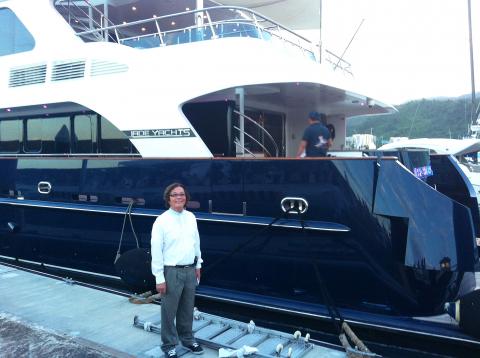Taiwan has rarely been regarded as a yachting destination on the world map, but it is believed to have potential for domestic yacht sales, as an increasing number of Taiwanese are becoming interested in yachting.
Taiwan’s yacht manufacturing industry is on the rise, said Han Pi-hsiang (韓碧祥), founder and CEO of the Greater Kaohsiung-based Jong Shyn Shipbuilding Corp (中信造船), who has been a strong supporter over the years of government plans to build yachting marinas.
SHOW STEALER

Photo: CNA
An exclusive yacht built by Han’s company at a cost of NT$300 million (US$10 million) stole the show at the inauguration of a marina at the Wushi (烏石) port in Yilan County on June 23. The ship, made with top-quality materials, is Han’s sample in his bid to attract global buyers.
After visiting the 30m long yacht in Yilan, Fisheries Agency Director-General James Sha (沙志一) praised the vessel as a work of excellent craftsmanship and attention to detail. He was particularly impressed by the marble floor, which he said is thinner than normal.
Han said he had already sailed the yacht to Qingdao, Shanghai and Hainan in China, as well as Hong Kong and Singapore, to take part in yacht expositions to promote Taiwan’s shipbuilding technology.
Having been in the business for several decades, Han said that Taiwan’s yacht-building techniques have been lifted to the “exquisite” level, but prices remain “fair” compared with European brands.
“Taiwanese work is substantive and on a par with Europe,” he said.
ECONOMIES
Optimistic about the outlook for Taiwan’s yacht industry, the veteran shipbuilder said he expects more Taiwanese to get involved with yachting — a big business in Europe, the US and Japan — thanks to the rise of Asia’s economies and the government’s relaxation of restrictions on recreational sailing along the coasts of Taiwan.
Of President Ma Ying-jeou’s (馬英九) i-Taiwan 12 public construction projects aimed at stimulating the nation’s economic growth, three fishing ports — Badouzi (八斗子) in Keelung, Wushi in Yilan and Anping (安平) in Greater Tainan — have been selected as locations for new marinas to help develop yachting in the nation.
The Badouzi Port Bisha Marina was inaugurated on Sept. 21 last year, while the Anping facility is expected to open next month, Han said, adding that he will take his boat there to help promote yachting.

TAKING STOCK: A Taiwanese cookware firm in Vietnam urged customers to assess inventory or place orders early so shipments can reach the US while tariffs are paused Taiwanese businesses in Vietnam are exploring alternatives after the White House imposed a 46 percent import duty on Vietnamese goods, following US President Donald Trump’s announcement of “reciprocal” tariffs on the US’ trading partners. Lo Shih-liang (羅世良), chairman of Brico Industry Co (裕茂工業), a Taiwanese company that manufactures cast iron cookware and stove components in Vietnam, said that more than 40 percent of his business was tied to the US market, describing the constant US policy shifts as an emotional roller coaster. “I work during the day and stay up all night watching the news. I’ve been following US news until 3am

Six years ago, LVMH’s billionaire CEO Bernard Arnault and US President Donald Trump cut the blue ribbon on a factory in rural Texas that would make designer handbags for Louis Vuitton, one of the world’s best-known luxury brands. However, since the high-profile opening, the factory has faced a host of problems limiting production, 11 former Louis Vuitton employees said. The site has consistently ranked among the worst-performing for Louis Vuitton globally, “significantly” underperforming other facilities, said three former Louis Vuitton workers and a senior industry source, who cited internal rankings shared with staff. The plant’s problems — which have not

TARIFF CONCERNS: The chipmaker cited global uncertainty from US tariffs and a weakening economic outlook, but said its Singapore expansion remains on track Vanguard International Semiconductor Corp (世界先進), a foundry service provider specializing in producing power management and display driver chips, yesterday withdrew its full-year revenue projection of moderate growth for this year, as escalating US tariff tensions raised uncertainty and concern about a potential economic recession. The Hsinchu-based chipmaker in February said revenues this year would grow mildly from last year based on improving supply chain inventory levels and market demand. At the time, it also anticipated gradual quarter revenue growth. However, the US’ sweeping tariff policy has upended the industry’s supply chains and weakened economic prospects for the world economy, it said. “Now

COLLABORATION: Given Taiwan’s key position in global supply chains, the US firm is discussing strategies with local partners and clients to deal with global uncertainties Advanced Micro Devices Inc (AMD) yesterday said it is meeting with local ecosystem partners, including Taiwan Semiconductor Manufacturing Co (TSMC, 台積電), to discuss strategies, including long-term manufacturing, to navigate uncertainties such as US tariffs, as Taiwan occupies an important position in global supply chains. AMD chief executive officer Lisa Su (蘇姿丰) told reporters that Taiwan is an important part of the chip designer’s ecosystem and she is discussing with partners and customers in Taiwan to forge strong collaborations on different areas during this critical period. AMD has just become the first artificial-intelligence (AI) server chip customer of TSMC to utilize its advanced